Forget Mykonos: Sarah Souli’s intel on drinking, eating, dancing (and cursing) in northern Greece
1. It’s not the south. Forget Mykonos, Santorini, or even Athens. The northern part of Greece, which shares borders with several Balkan countries and Turkey, is a distinct destination. In the east is the country’s cultural capital, Thessaloniki, where ancient ruins sit next to modern apartment buildings in architectural anarchy. The majority of the city’s majestic palm trees were ripped up during the dictatorship, so for greenery, head west through the mountainous region full of cliffs, gorges, and forests to the north’s other major city, lakeside Ioannina. You’ll be in historic company: the Macedonians, Illyrians, Romans, Byzantines, Slavs and Ottomans have all passed through here, leaving their mark on the region’s architecture, culture, and food.
2. Have some extra cash on hand. One thing the north has in common with the rest of Greece is the economic crisis and crippling austerity measures. Thousands of people have lost their jobs, homes, savings, and in some cases, lives. Salaries have been slashed or unpaid altogether. Though the streets are still filled with people shopping and eating, the ongoing economic instability has, to say the least, had a negative effect on the population. In June, capital control was introduced across the country; Greeks can only withdraw 60 Euros daily from their accounts. This does not apply to foreign bank holders, but the lines at ATMs can be long. Prepare accordingly.
3. Soak up the Ottoman history. The Byzantines might have ruled Greece for over 1000 years, but the legacy of the Ottomans, who were present from the mid-15th century until the establishment of the modern Greek state in 1832, is more tangible. Walking around certain neighborhoods or towns, you’ll feel squarely in the Muslim world. Minarets reach skyward, and domed mosques dot the landscape. In Ioannina, be sure to visit the Ali Pasha Museum, located in his island summer home (accessible by boats, which leave frequently from the corniche). Fautis Rapakousis, a former baker who began collecting Ali Pasha relics when he was 17, is the jovial and informative owner of the museum (entry €3), which gives an impressive overview of the contentious Pasha’s life and death.
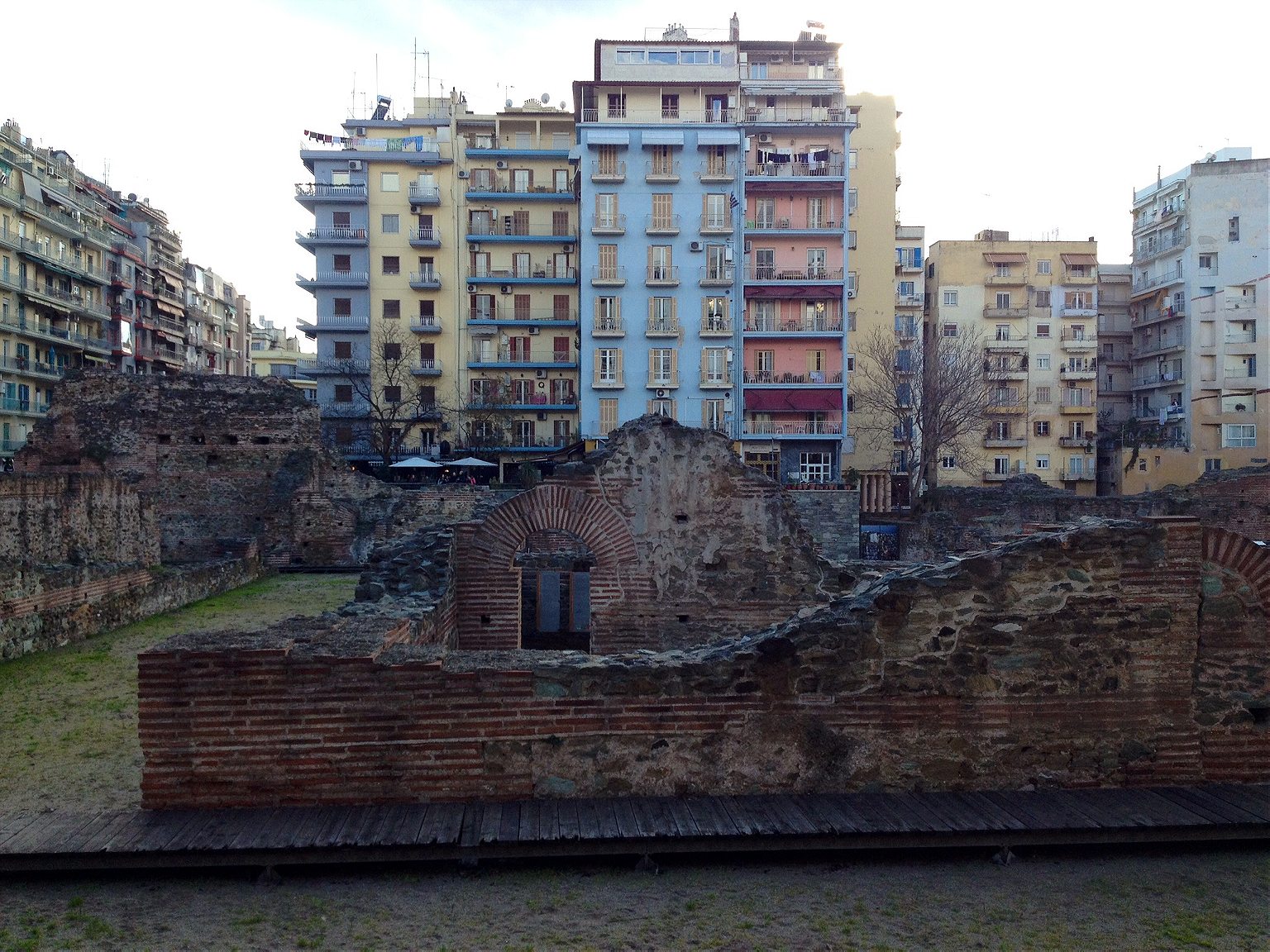
4. Make space. For the food, that is. It’s a cliche to say a people love to eat (who doesn’t?), but Greeks take it to a whole other level. Enter any home and you’re guaranteed to find something in the oven. It’s all delicious: salty feta, stuffed vegetables, grilled meat and fish, creamy pastitsio, marinated sweet red peppers, souvlaki, cheese pita, potatoes cooked in lamb fat. Quantity is just as important as quality, and portion sizes routinely rival the Cheesecake Factory. Food is everywhere: order an espresso and it comes with a plate of cookies; buy a beer and you’re guaranteed a serving of meze. If you’re in someone’s house and they like you, they will feed you directly off their fork. Your job is to open your mouth dutifully like an infant to receive whatever is on the other end, which is how, one evening, I found myself eating lamb eyeball.
5. This isn’t the place to be a teetotaler. What do you do when your host’s 64-year old father hands you a glass of homemade alcohol along with your morning coffee? You drink it, of course, and proceed to do this every day before noon for the next ten days. It’s rude to refuse a drink under most circumstances, so be prepared to clink glasses and shout out yammas!(cheers!). Tsipouro, made from distilled grapes and sporting a 45% alcohol content, is the beverage of choice. The best places to drink are tsipouradikas, bars that serve €2 bottles of tsipouro, accompanied by an enormous quantity of meze. In the west, it’s served plain, without ice; move east and it’s flavored with anise and served cold. During the winter, you can order tsipouro muddled with honey and cinnamon. A warning: as long as you’re sitting down, you’ll feel composed. Stand up, and you’ll have forgotten your own name.
YOU CAN CURSE OUT JUST ABOUT ANYTHING, FROM THE VIRGIN MARY TO THE ANTI-CHRIST
6. Don’t watch your mouth. To the puritan American ear, Greek can seem like an endless stream of profanity. In one particularly surreal moment, a muscular blonde man seated near our table stood up to leave. “I’m going to take the dick home,” he announced to a table half full of strangers, motioning to his boyfriend, a bearded Orthodox priest in full garb. “With God’s blessing!” the priest said. No one batted an eye. In Thessaloniki, I overheard a man tell a pigeon who had landed near him, “I fuck your Christ!” Indeed, you can curse out just about anything, from the Virgin Mary to the anti-Christ, without offending a soul. The only thing absolutely off-limits is one’s mother.
7. Dress for respect. No matter age or gender, Greeks are fastidiously tidy and trendy dressers. Shoes are polished, hands are manicured, hair is blown out and makeup is perfectly applied at all times of day. If you want to fit in, bring your nicest outfits, highest heels, and paint your nails- normcore is not a concept here. “But…why?” a new friend asked, wrinkling up her nose when I explained that in Brooklyn, it’s hip to sport unwashed hair and moth-eaten sweaters. For many Greeks, it’s a matter of respect, to both yourself and others, to dress nicely. If shopping and self-care are your thing, you’ll be in paradise: pedicures are around 12 Euros, brands like Orsalia Parthenis offer chicly tailored outfits, and Korres beauty products, which run over $50 in the US, can be bought for €5 in pharmacies.
8. There’s more than one Macedonia. Hear the word ‘Macedonia,’ and you might innocently think it’s the name of a small, Slavic country that gained independence from Yugoslavia in 1991. But in Greece, where millions of people identify as ethnically Macedonian, Macedonia refers to a province in the north known as the birthplace of Alexander the Great. The Greek government rejects the naming of Macedonia as an independent country, claiming historical and territorial concerns. Greece has also accused Macedonia of appropriating Hellenic symbols that are integral to Greek culture. The naming dispute resulted in a breakdown of relations between the two countries, with Greece placing an embargo on Macedonia in 1994 and vetoing the country’s EU and NATO applications. Don’t be surprised if a Greek insists you call it Skopje.
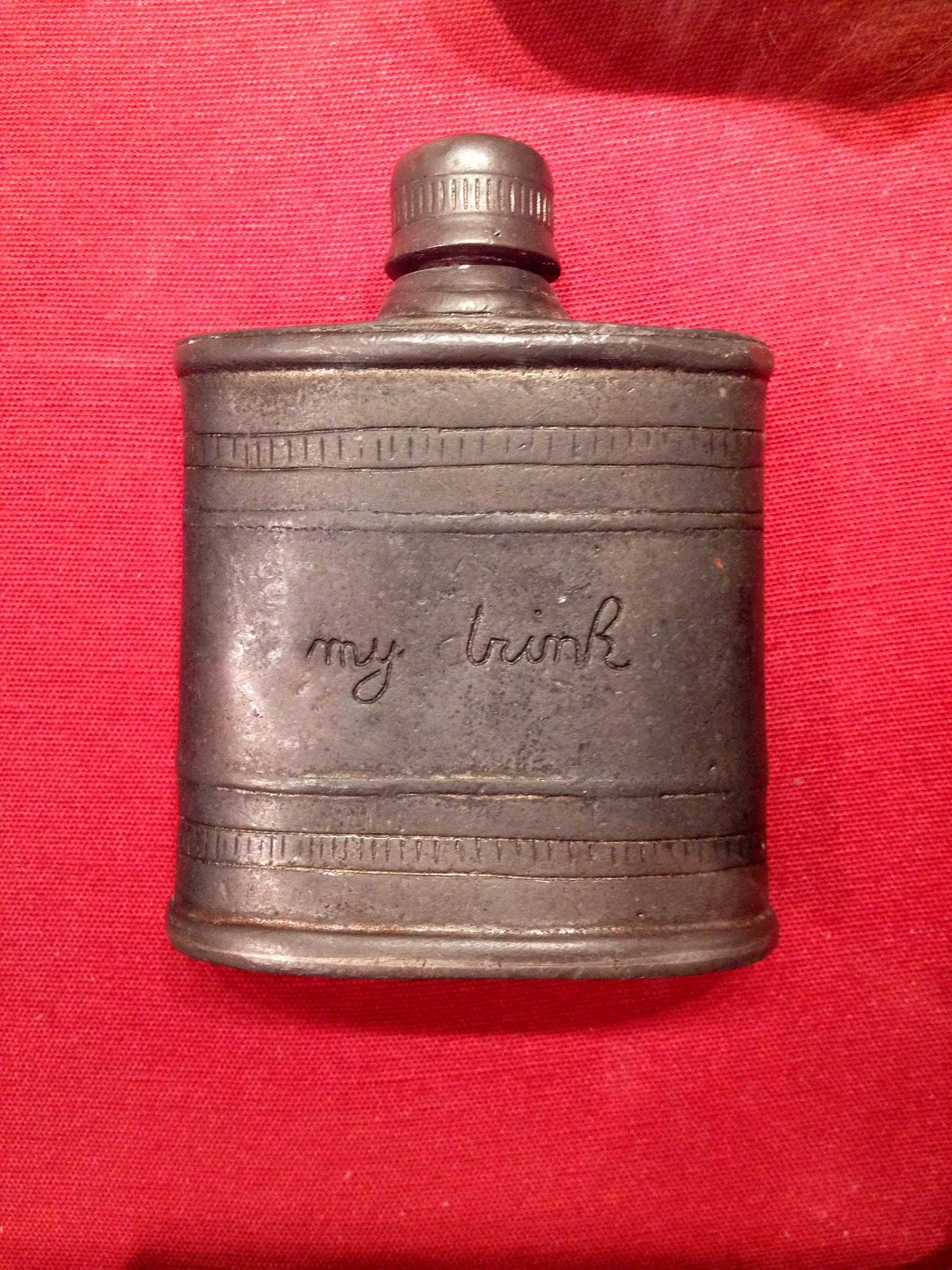
9. There is 24/7 hot spring access. There are hot springs all over the northeast. A few hours outside of Thessaloniki, in Aridea-Pozar, there are thermal baths reported to have healing qualities. You can opt for the outdoor springs, with gushing hot waterfalls and steam rising amongst the trees and rocks, or book a private room at one of the many spas that have rerouted the water. Both the outdoor baths and spas are open 24 hours. For a particularly magical experience, go very late during a moonless winter night, when the air is crispest and the stars brightest.
10. Don’t be a cold fish. With a few exceptions, Greeks are generally very affectionate and warm. Within an hour of meeting a new friend, she slipped her arm into the crook of mine. “Let me just…” she said, and we strolled down the street as though we had known each other for years. It’s very normal for people to touch, kiss, and hug each other, between both men and women and among relative strangers. Embrace it.
11. Meat is on the menu. In the north, the sparse-on-meat Mediterranean diet only really applies to seaside Thessaloniki. Everywhere else, particularly in the province of Epiros, expect piles of perfectly seasoned meat served with soft, fresh cheeses and chopped salads. In the tiny mountain town of Metsovo, head to Pente Fi, a no-frills restaurant serving grilled lamb bits on pieces of parchment paper. If you want to taste young female lamb, a regional specialty, you’ll have to arrive before 10am (they sell out early). Otherwise, try kokoretsi, lamb intestines grilled to a crunch wrapped around tender liver and sweetbreads. Eschew the plastic forks – everything tastes better eaten with your hands. And if you’re going in for souvlaki, eat it straight off the stick by firmly placing your teeth around the meat and pulling the stick away from your face.
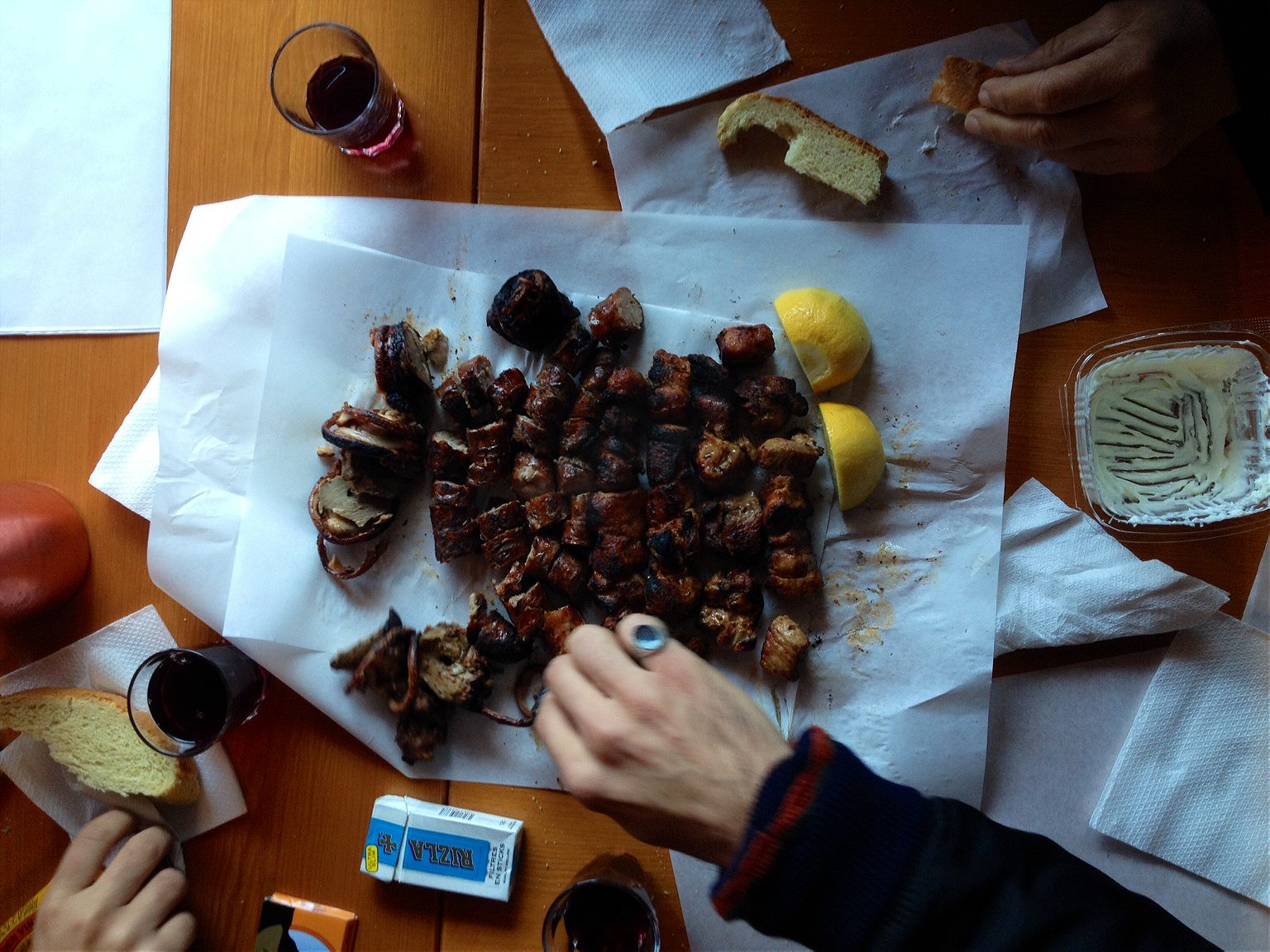
12. Respect the evil eye… and your horoscope. Several days into a terrible headache, a friend called his grandfather to cure me. A few drops of oil in water, several muttered prayers, and a diagnosis revealed itself: I had the evil eye. Many Greeks are superstitious about the eye, hanging blue circles in their windows, dashboards, and around their necks. While you might not experience the eye, you will be asked your star sign within five minutes of meeting most people. “Virgo, eh,” new acquaintances would say with a knowing nod. No one could tell me exactly why star signs are so important (a conversation starter? a way of categorizing people?), but Northern Greece is a good place to read your horoscope guilt-free.
13. Learn a dance. A very popular TV show in Greece shows a roomful of moderately famous people eating and drinking around long white tables. There’s always someone singing very theatrically, and the rest of the guests are dancing, or nonchalantly throwing plates. Everyone, including blasé teenagers, knows at least one dance routine. It’s not uncommon to walk into a living room and see parents dancing to traditional music, huge smiles plastered across their faces; during street festivals, weddings, and parties, hundreds of people will be dancing. You will be invited to dance – don’t be embarrassed – just grab a shoulder and try and follow the grapevine-like footsteps. It’s less of a booty wiggle and more of an up-and-down motion with the occasional jump. However you move, you’ll be lauded for trying.
14. …and while you’re at it, learn a song, too. After several weeks in Greece, I began to lose track of the number of times people spontaneously burst into song in cafes, restaurants, and at home. This is a music culture, and everyone is fiercely proud of it. There’s a preference for strong voices and string instruments: lioutas, lyras, mandolin, bouzouki and the adorably tiny baglamas (intentionally small so musicians could stash them under their coats to avoid persecution during particularly unfun times in the 20th century). Traditional music is popular with all generations, so brush up on a few of the classics, including Xaris Aleksiou, Manos Xatzidakis, Dimitra Galani and Giorgos Batis.
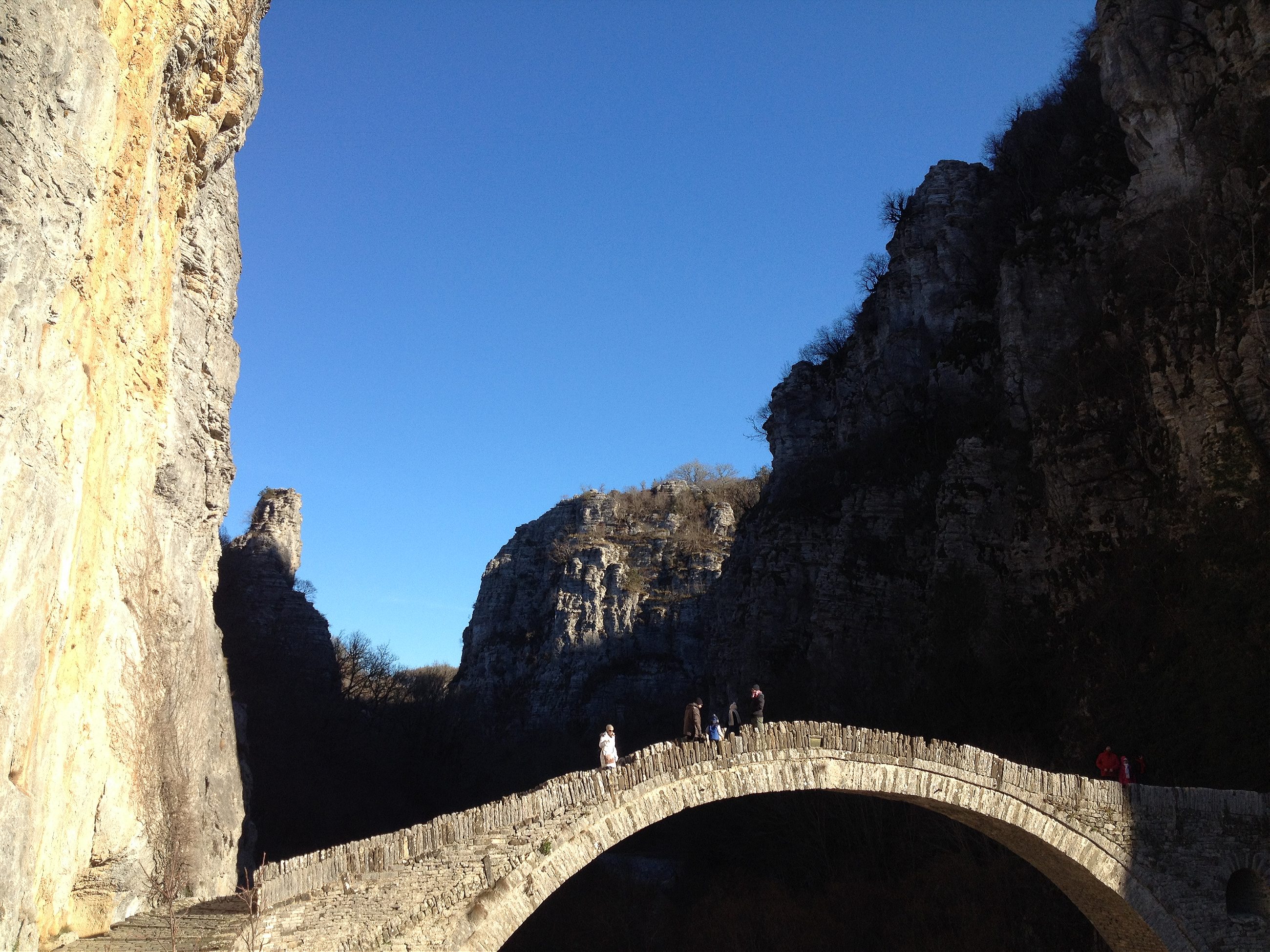
15. The mountains are open. For nearly 20 years, the Greek government was involved in a massive infrastructure project that created a series of highways connecting the mountainous eastern and western part of the country. Completed in 2009, the Egnatia Odos stretches for 670 km, comprising some 1670 bridges and 76 tunnels. Travel time between major cities was slashed in half, and getting to smaller villages in the Pindos mountain range has never been easier. You’ll find stone ‘forests,’ massive cliffs, and picturesque slate villages like Zagorohoria and Metsovo. The original roads, which are tiny and winding, are equally beautiful and often empty, save for a few cows.
16. Transportation seems randomly priced. Taxis and buses in cities like Ioannina and Thessaloniki are very cheap, particularly compared to other European cities, but regional buses and trains can be surprisingly expensive. An hour and a half bus ride can cost over €20. If you’re traveling outside the major cities, it might be best to rent a car.
17. Breakfast is more than coffee and cigarettes. While both are available in harmful abundance, it’d be a grave mistake not to eat a mpougatsa first thing in the morning. Filled with either salty cheese or sweet cream dusted with powdered sugar, mpougatsa is a flaky, crispy pie (“But not exactly a pie,” people kept reiterating) always served warm and always cut into tiny squares with a double-handled blade. You can buy them almost anywhere, but if you’re in Ioannina, head to Select, a sparsely decorated cafe run by an industrious septuagenarian couple. They’ve been making cheese and cream mpougatsa, and nothing else, their whole lives.
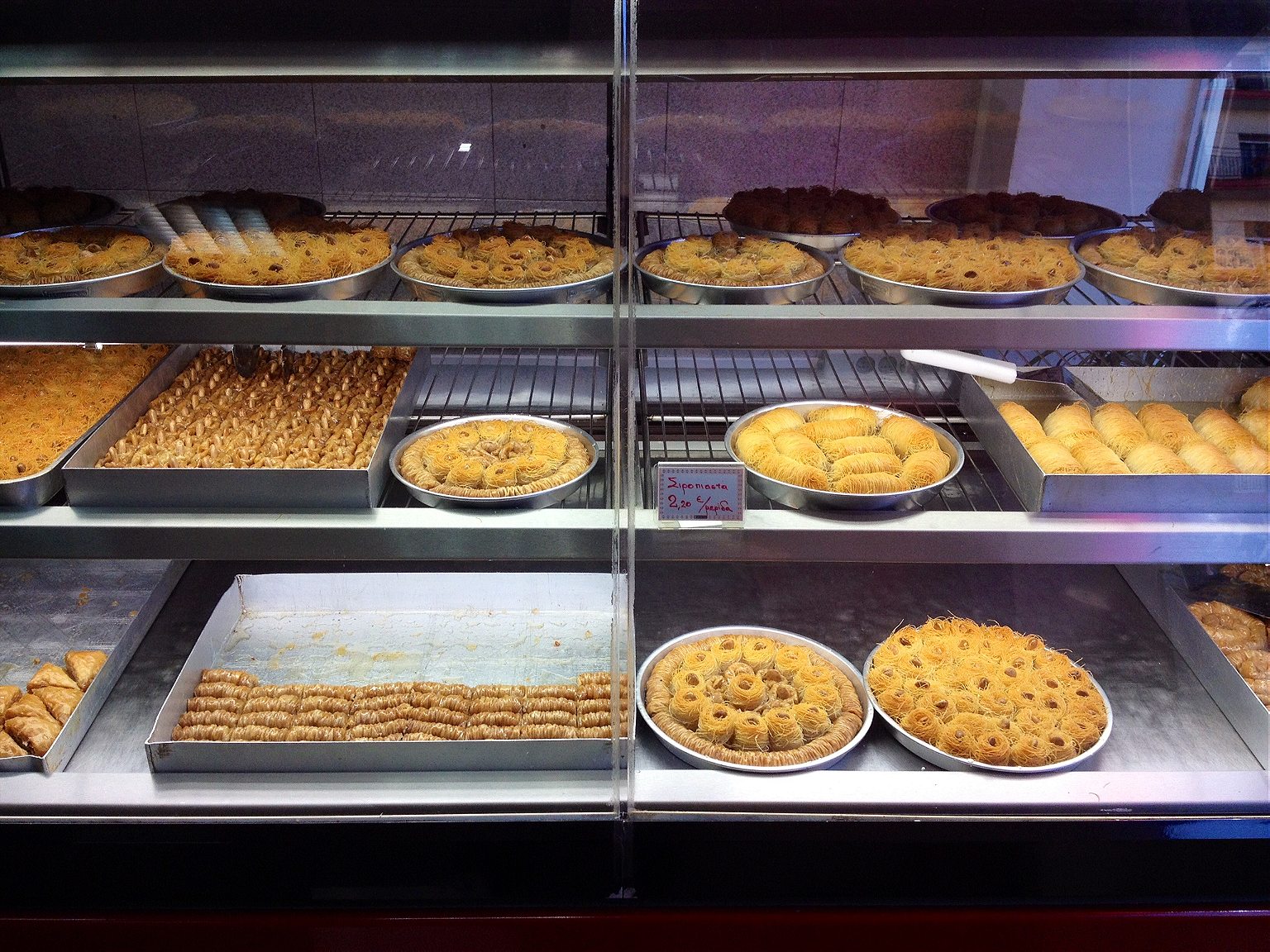
18. DJ Spacebilly has the hot tracks. During the holidays, you’ll often stumble upon street festivals, complete with big brass bands reprising Greek classics and hoards of well-heeled dancers. The port city of Thessaloniki also offers more conventional options. There aren’t many nightclubs, but the bars act as intimate dance floors, with Greek DJs spinning techno, house, and disco. Start the evening at Don’t Tell Mama to hear DJ Spacebilly play the city’s best music (as a bonus, the bartenders are particularly beautiful). Bord de L’eau, which also doubles as a ‘design factory’ and brings DJs from around the country, has a chiller vibe, while Berlin Bar, which is loud and sweaty and features a perpetually occupied stripper pole in the back, is the perfect place to end the night.
19. Florina is a restful respite. Located 16 km from the border with Macedonia (or Skopje, depending on who you’re talking to) is the impossibly picturesque town of Florina. It’s situated in a micro-climate, with four perfect seasons lasting exactly three months each, meaning you can ski in the winter and swim in the rivers during the summer. It’s a town for strolling and eating: be sure to dine at Genteki, a slow-food restaurant run by a sweet couple. Small plates are prepared on a stovetop over pieces of aluminum foil, and whole ducks are roasted in a wood burning oven. A quick jaunt down the river will lead you to Cafe Roza, where you can drink a well-executed Greek coffee surrounded by treasures brought back from Turkey.
20. It’s all Greek to you. Yes, what looks like the letter P is actually pronounced as an R and the upside V is an L-sound, but if you’ve spent any time on a college campus, you already know half the Greek alphabet. English is heavily influenced by Greek, and you’ll be surprised by how many words you already know. Though most young Greeks speak fluent English, it’s always nice to have a few phrases handy: yassas (hello), kalimera (good morning), ti kanis (how are you?), efharisto (thank you), eimai pliris (I’m full!), plaka mou kaneis (are you kidding me?!).